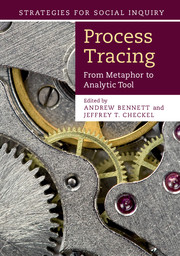Book contents
- Frontmatter
- Contents
- List of figures
- List of tables
- List of contributors
- Preface
- Part I Introduction
- Part II Process tracing in action
- 2 Process tracing the effects of ideas
- 3 Mechanisms, process, and the study of international institutions
- 4 Efficient process tracing
- 5 What makes process tracing good?
- 6 Explaining the Cold War’s end
- 7 Process tracing, causal inference, and civil war
- Part III Extensions, controversies, and conclusions
- Appendix Disciplining our conjectures
- References
- Index
3 - Mechanisms, process, and the study of international institutions
Published online by Cambridge University Press: 05 November 2014
- Frontmatter
- Contents
- List of figures
- List of tables
- List of contributors
- Preface
- Part I Introduction
- Part II Process tracing in action
- 2 Process tracing the effects of ideas
- 3 Mechanisms, process, and the study of international institutions
- 4 Efficient process tracing
- 5 What makes process tracing good?
- 6 Explaining the Cold War’s end
- 7 Process tracing, causal inference, and civil war
- Part III Extensions, controversies, and conclusions
- Appendix Disciplining our conjectures
- References
- Index
Summary
Introduction
In an agenda-setting essay first published in 2002, Lisa Martin and Beth Simmons argued that the study of international organizations (IOs) and institutions (IIs) had reached an important threshold, focusing less on why they exist and more on “whether and how they significantly impact governmental behavior and international outcomes” (Martin and Simmons 2002: 192). Put differently, the past decade has seen a sustained move by students of international institutions and organizations to viewing their subject matter as independent variables affecting state interests and policy. Conceptually, this has put a premium on identifying the mechanisms connecting institutions to states; methodologically, there has been a growing concern with measuring process.
In this chapter, I assess several studies that make claims about international institutions influencing state-level action through various processes and mechanisms. The move to process and to the method of process tracing has been salutary, I argue, producing rich and analytically rigorous studies that demonstrate the multiple roles – good and bad – played by institutions in global politics.
- Type
- Chapter
- Information
- Process TracingFrom Metaphor to Analytic Tool, pp. 74 - 97Publisher: Cambridge University PressPrint publication year: 2014
- 10
- Cited by

